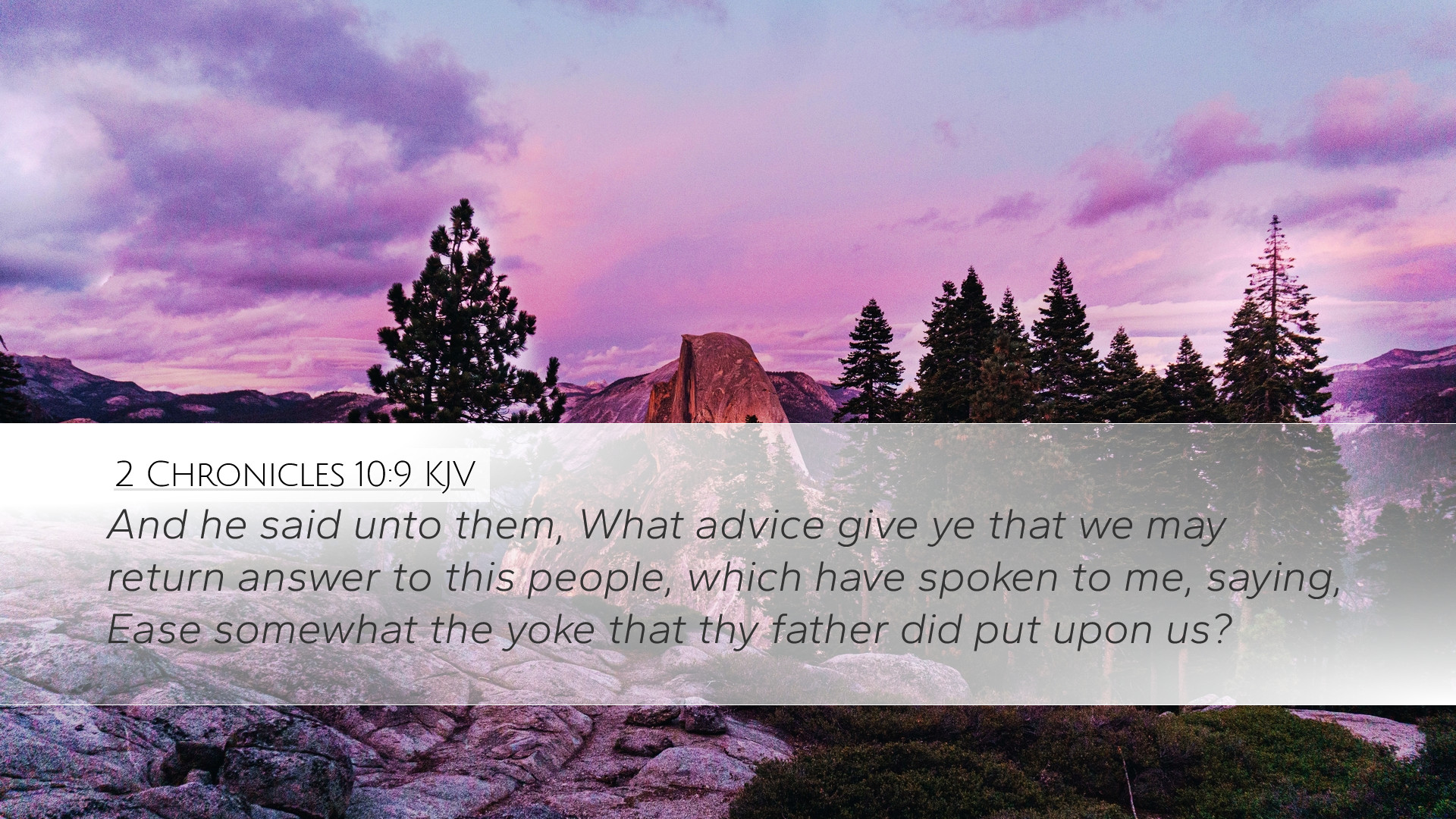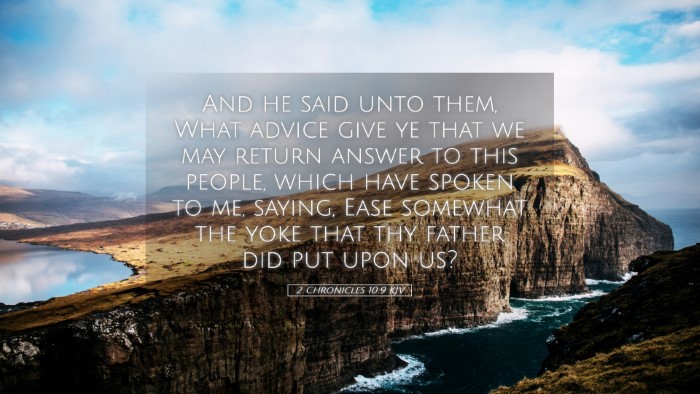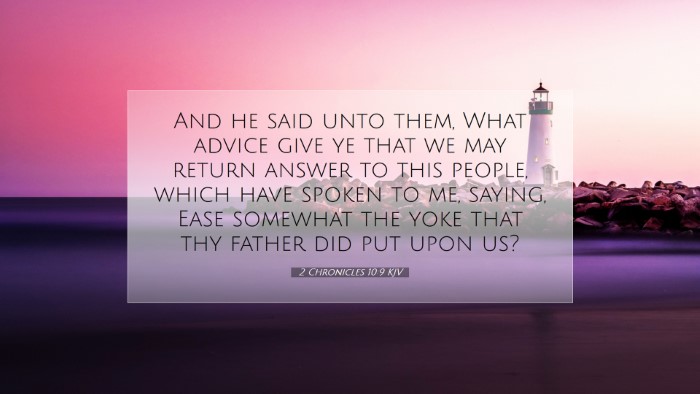Commentary on 2 Chronicles 10:9
Verse Text: "And he said unto them, What advice give ye me to return answer to this people, which have spoken to me, saying, Ease the yoke that thy father did put upon us?"
Introduction
The verse under consideration, 2 Chronicles 10:9, presents a critical moment in the transition of royal authority from Solomon to his son Rehoboam. This verse captures the essence of leadership, counsel, and the pivotal choices that define a ruler's relationship with their subjects. In this commentary, we shall explore insights derived from various public domain commentaries, providing a comprehensive analysis for scholars, theologians, and students of the Bible.
Contextual Background
This passage is set during a time of political transition following Solomon's reign. Solomon, while known for his wisdom and wealth, also imposed heavy taxes and labor on the people of Israel. As Rehoboam ascends to the throne, the people are seeking relief from the burdens imposed by Solomon. Their plea for relief is a pivotal moment that tests Rehoboam's capacity for leadership and governance.
Rehoboam's response to this request highlights the importance of seeking wise counsel, which can define the fate of his kingdom and the loyalty of his subjects. Understanding this historical and political backdrop is critical in interpreting Rehoboam's request for advice.
Analysis of the Verse
In this verse, Rehoboam positions himself as a ruler seeking guidance. The urgency of his question reflects a deep need for counsel in light of the potential upheaval within his kingdom. Public domain commentaries by Matthew Henry, Barnes, and Clarke provide profound insights into the implications of this moment.
-
Matthew Henry's Perspective
Matthew Henry emphasizes the necessity of wisdom in leadership. Rehoboam’s instinct to seek advice before making a decision signals his awareness of the complex dynamics of rulership. Henry suggests that seeking counsel is a virtue of good governance, and leaders must prioritize the well-being of their people above their pride or ego. He also notes that in asking for advice, Rehoboam is presented with an opportunity to either continue the practices of his father or chart a new course that could lead to either prosperity or division.
-
Albert Barnes' Insights
Albert Barnes draws attention to the nature of the counsel being sought. He remarks that the advice Rehoboam receives will ultimately shape the future of the nation. Barnes explores the contrast between diverse sources of counsel: the elders who served Solomon and the younger advisors who would later influence Rehoboam. He implies that wisdom often lies in experience and past leadership, making it crucial for Rehoboam to engage with the wisdom of the older generation, rather than solely depending on youthful advice.
-
Adam Clarke's Commentary
Adam Clarke provides a theological reflection on the nature of servitude and governance. He highlights that the people’s request to "ease the yoke" is more than a mere desire for better treatment; it reflects a longing for justice and compassion from their ruler. His commentary notes that Rehoboam's decision, influenced by the quality of counsel he receives, would have long-standing implications not only for his reign but for the kingdom's future unity. Clarke emphasizes that the ruler’s heart towards the people can pave the way for either prosperity or division among the tribes of Israel.
Theological Implications
The verse and its surrounding context open a dialogue regarding the nature of authority and the responsibilities that accompany it. Rehoboam’s inquiry demonstrates a critical principle in Christian leadership: the need for humility and the pursuit of wisdom from trusted sources. This theme resonates with pastoral leaders and scholars alike, as they navigate the challenges of their own leadership responsibilities.
Moreover, it prompts deeper inquiries into how modern leaders respond to the needs of their communities. The expectations of the populace, as seen in this passage, can serve as a model for contemporary leadership approaches that prioritize empathy and responsiveness. The resulting outcome of Rehoboam’s decision-making will be a lesson in the importance of wise counsel and its impact on communal well-being.
Application for Modern Leaders
-
Seek Wise Counsel: Leaders, be they in ecclesiastical, political, or community settings, benefit from gathering diverse perspectives. Engaging with seasoned professionals, mentors, and peers can offer insights that safeguard against hasty or destructive decisions.
-
Prioritize the People’s Needs: Like the Israelites who sought relief, modern leaders must be attentive to the needs of their constituencies. Awareness of the burdens faced by those they lead fosters an environment of trust and goodwill.
-
Embrace Humility: Rehoboam’s initial approach is commendable for its recognition of his limitations. Today's leaders need to acknowledge that their authority does not make them infallible and that mistakes should be seen as opportunities for growth rather than failures.
Conclusion
The inquiry of Rehoboam in 2 Chronicles 10:9 is rich with lessons about the nature of leadership, the significance of wise counsel, and the responsiveness required of those in power. By reflecting on the insights provided by commentators such as Matthew Henry, Albert Barnes, and Adam Clarke, contemporary readers can glean profound wisdom applicable to their own contexts.
Ultimately, this passage serves as both a warning and an encouragement to leaders, reminding us that the choices we make in leadership ripple through time, shaping communities and legacies long after we are gone.


